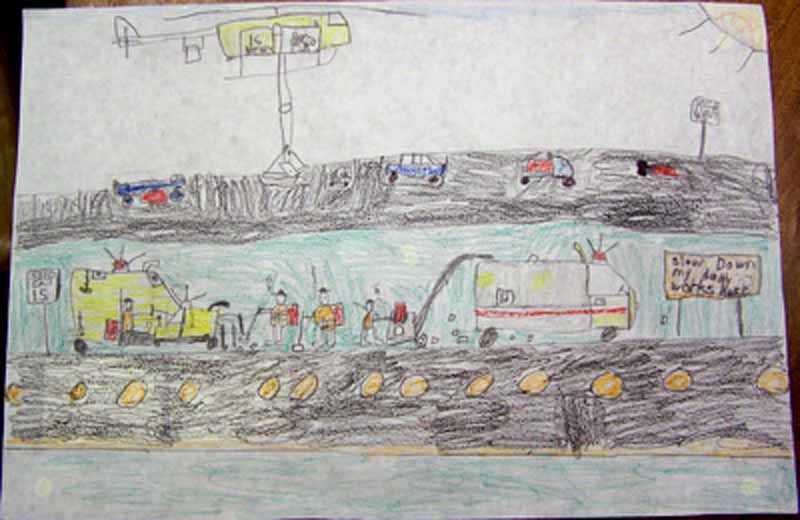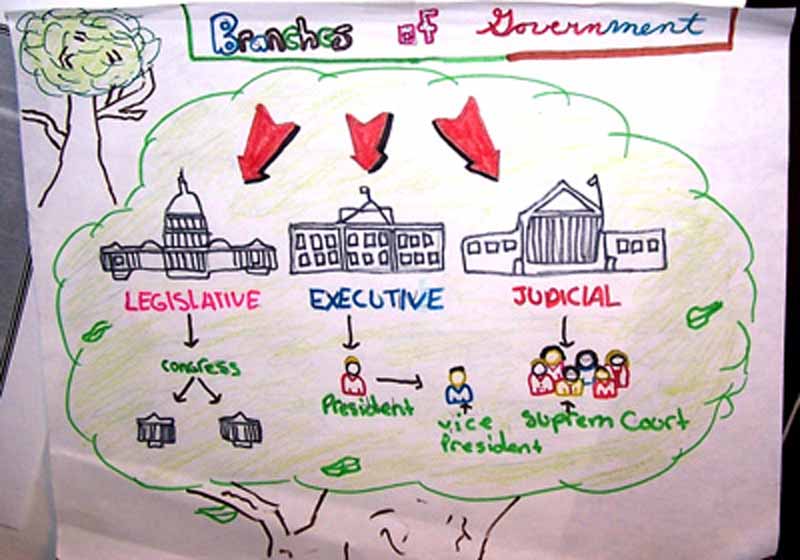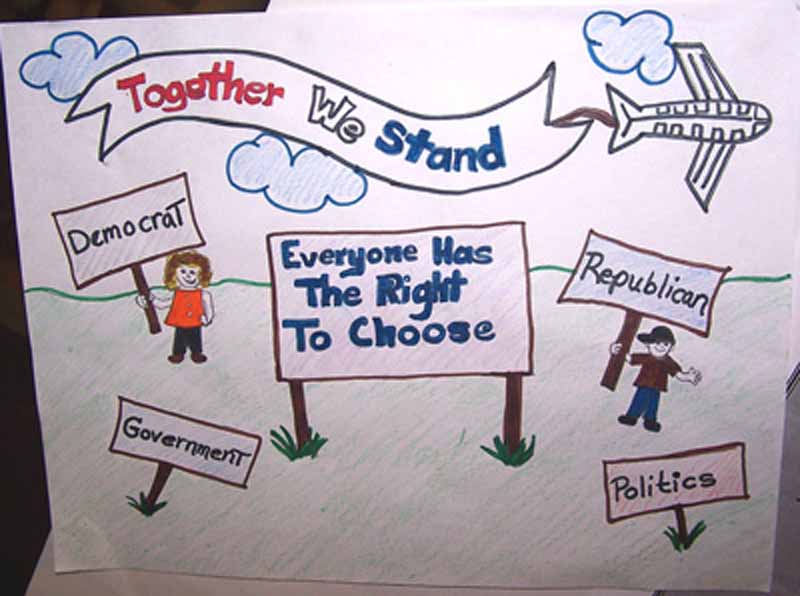Law Day 2005 Art & Essay Contest Winning Entries
Law Day 2005 was celebrated in court room 1 of the Lycoming County Court House on April 29, 2005. Here are the winning art and essay entries:
In our country we have freedom of speech. We also have rules to follow. At our school you have to be kind. It would be wrong to wear clothes that say you hate the president. If everyone said whom they hate, other people would say whom they hate too and our country should be a horrible place. I think we should say nice things to each other, even when we don't agree. We should learn to solve problems that way. It a child came to our school wearing a mean shirt, I would send him or her home if I were the principal.
Lydia Culp, Jackson Elementary School
Why the Principal Shouldn’t Send Us Home
I believe that we have the right to wear whatever we want for the following reasons. First, it’s not against the law to wear the shirt. It’s a free country and we have the right to speak up if we don’t like our leaders. Second, we should teach students to respect others even if they don’t like what they think. We should care about people’s freedom to say what they believe even if most people don’t like it. Finally, to learn how to be a good citizen in America, you must practice being one even if it’s hard and takes courage and patience.
Emma Youngman, Myers Elementary School
If a student shows up at school with a shirt that says, "I hate President Bush," the principal should be allowed to send that student home because expressions of hatred directed toward anyone should not be tolerated within school, and nothing good can come of it. I think that student shouldn't be able to wear the shirt.
One reason that the student should not be allowed to wear it is that freedom of speech should not be used to promote hatred. It could also be distracting, and disruptive to other students trying to learn.
Furthermore, where do you draw the line? For example, if you didn't like your teacher Mrs. Smith you could wear a shirt that says, "I hate Mrs. Smith." Where does it end?
In conclusion, the principal should be allowed to send the student home because expressions of hatred directed towards anyone shouldn't be tolerated, and nothing good can come of it. That's why the principal should have authority to send he/she home.
Tess Marshall. Schick, Elementary School
Public school students do not “shed their constitutional rights to freedom of speech at the schoolhouse gate.” This is what the United States Supreme Court said in Tinker v. Des Moines School District in 1969. Students wore black arm bands to school in order to protest the Vietnamese War. The school ordered them to take the arm bands off and the students refused. The Court recognized that the arm bands were political speech and protected by the First Amendment.
The court says that political speech by students is absolutely protected unless the speech will disrupt the school. In Barber v. Dearborn Public Schools a student wore a T-shirt that said President Bush was an international terrorist. The court said the student was allowed to wear his shirt because it was political speech that was absolutely protected.
A public school official can not tell a student to remove a T-shirt that has a political message on it. Just because someone is under 18 and at school doesn’t mean they aren’t protected by the First Amendment.
Catie Kilgus, St. Boniface Elementary School
We must realize that the captured soldiers have human and basic rights, and they should not be violated with extreme violence. The Geneva Convention says that prisoners should not be subject to torture, medical or scientific experiments, violence, intimidation, insults, and the curiosity of the public. I agree with this because I feel you would get better results by following these guidelines, and reducing the prisoners fear and anger towards us.
I feel that restricting sleep and/or food can be a useful tool but we should try to coax the information from the prisoner. This method will certainly take more time, but it may promote a better understanding between two countries which may go far to eliminate the need for future wars.
To conclude, I feel that prisoners with vital information should be treated with dignity because it is the humane thing to do. If prisoners are treated with respect, they may cooperate more easily.
Mary Imgrund, Bishop Neumann High School
What Are The Limits
The U.S. Army believes that a person captured on the battlefield in Afghanistan has information, which, if revealed, could save lives. What limits should be applicable to the treatment of the prisoner? Many want to interrogate him/her with little to no pain, while others want to interrogate with severe consequences, such as deprivation of things important to the human body, or even death. This is one of the main concerns of the news media and the people of today.
Punishment of persons caught on the battlefield in Afghanistan should be taken with great discernment. I think the person caught should be interrogated. However I think that American troops should take into consideration the human rights that we so cherish as Americans, but have so been forgotten on the battlefield. Those interrogating should be of higher power and should be well qualified for this specific reason. However, those persons captured in uniform should be treated a little harder than those out of uniform, because those in uniform know more information helpful to the American troops. Those out of uniform could be just an average citizen, but it should not be taken so lightly as to give away or let go what could have been valuable information (Holzer).
Throughout the war in Afghanistan 108 people have died. These deaths have all been investigated to find the root cause A quarter of those dead were found to have been killed by violent abuse by U.S. personnel. Where some of the others, were found dead through homicide or other erratic causes (Seattle). The cause of death can be avoided by the U.S. personnel, with some time and care. We as Americans do not want to be associated as being a bully: as going in and taking over, in all the wrong ways. Right now, the U.S. is associated with helping smaller countries in times of war or hardship, why loose that good reputation? However, if we continue down this road of violence, our country could be labeled as a nuisance or even a terrorist.
While America may have some bad in it, there are also plenty of good things America does for smaller countries. In today’s society we are more concerned to find the bad in someone then find the good. That’s the same with today’s media; they search for the bad in every situation instead of finding that one good thing. In 2004 we saw the horrifying pictures of U.S. troops abusing a prisoner of war, while this may be true, there are also a lot of good U.S. troops who are doing the right things. Many of our troops have gotten valuable information that has been helpful to us in this war; by holding the person captive and interrogating, but have done nothing to humiliate or hurt the prisoner. That is the correct way to get information from a source that could be valuable.
In conclusion, abuse of human rights is not the answer in getting information from a valuable source, but certain steps and precautions should be taken to get the information needed. Therefore, this situation should not be taken so lightly as to harm America, but it should also not be taken so hard as to ruin our reputation and that of the prisoner.
Hannah Yates, Loyalsock High School
 Curtis McAllister, Christian School at Cogan Station
Curtis McAllister, Christian School at Cogan Station

Eric Schulden, Ashkar Elementary School

Brooke Crist, McCall Middle School

Rhonda Beck, Montoursville High School

